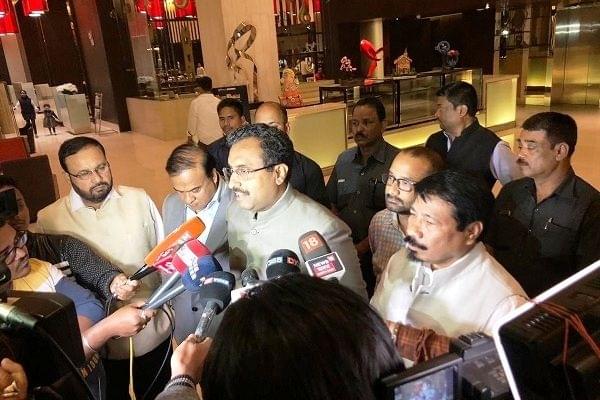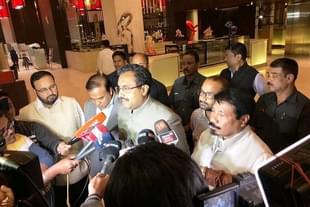Politics
BJP’s Deft Political Management Could See NDA Bagging Most Seats In North East
Jaideep Mazumdar
Mar 18, 2019, 01:10 PM | Updated 01:07 PM IST
Save & read from anywhere!
Bookmark stories for easy access on any device or the Swarajya app.


Even a couple of weeks ago, the Bharatiya Janata Party’s (BJP’s) claim that the party and its allies in North East India could bag most of the region’s 25 Lok Sabha seats came across as a lot of bravado and make-believe. The regional allies of the BJP seemed very keen on distancing themselves from the saffron party. And popular anger over the BJP’s unsuccessful attempt at enacting the controversial Citizenship (Amendment) Bill had not ebbed at all. The BJP appeared to be on a losing wicket, and political pundits predicted that the Congress would gain immensely from the Citizenship Bill fiasco.
But things have changed dramatically in the past few days. The BJP’s top political managers got the Asom Gana Parishad (AGP), which had severed its alliance with the BJP in early January over the Citizenship Bill, back into the fold.
At a late night meeting earlier this week, top leaders of both the parties decided to bury their differences and fight the Lok Sabha polls together. The three AGP ministers who had resigned from the council of ministers in early January also took back their resignations.
But it was not just the AGP which the BJP won over. BJP national general secretary Ram Madhav, who is also the party’s minder for the North East, held parleys with constituents of the North East Democratic Alliance (NEDA). Many of these regional parties, including Meghalaya Chief Minister Conrad Sangma’s National People’s Party (NPP) and Nagaland Chief Minister Neiphiu Rio’s Nationalist Democratic Progressive Party (NDPP) — both constituents of the NEDA— had distanced themselves from the BJP over the Citizenship Bill.
The bill had generated widespread anger in the North East, especially in Assam which witnessed intense agitations by various bodies all over the state. The chief ministers of Meghalaya, Mizoram, Nagaland and Manipur had openly opposed the bill and urged the National Democratic Alliance (NDA) government to junk it.
Manipur has a BJP-led coalition government comprising the NPP and the Naga People’s Front (NPF) and headed by the BJP’s N Biren Singh as Chief Minister. Singh was vocal in his opposition to the Citizenship Bill. The tribal Indigenous People's Front of Tripura (IPFT), a partner in the BJP-led coalition government in Tripura, had also opposed the bill and threatened to snap ties with the saffron party.
The Mizo National Front (MNF), which is in power in the state and a constituent of the NEDA, had also distanced itself from the BJP over the bill. All the parties had vowed to sever all ties with the BJP if the bill, which was never passed by the Rajya Sabha and has lapsed since then, was enacted.
Given the strong opposition to the bill by the BJP’s regional allies and constituents of the NEDA, and widespread anger and disenchantment among the people of the region with the BJP, it had appeared that the BJP had brought irreversible damage upon itself by pushing the bill.
By all accounts, the BJP appeared to have slim chances of winning even a fraction of the region’s 25 Lok Sabha seats. And the Congress, which had been wiped out entirely from the North East, seemed all set to gain from the BJP’s ‘adventurism’ with the Citizenship Bill and stage a comeback.
But in stepped the BJP’s managers led by Ram Madhav and NEDA convenor Himanta Biswa Sarma. After the Citizenship Bill was not introduced in the last session of the Rajya Sabha in mid-February, BJP leaders started working on the party’s regional allies.
A series of meetings were held with the leaders of the NEDA constituents and also a number of influential civil society organisations. The BJP’s reasons for introducing and pushing the bill were explained to them. And all of them were assured that the bill would be modified to protect the interests of the indigenous people of the North East before it is reintroduced.
The BJP leaders assured the regional parties that their concerns will be respected and a modified Citizenship Amendment Bill would incorporate all these concerns. They were assured that they would be consulted and would be made part of a yet-to-be-framed mechanism to redraft the bill. These assurances were welcomed by the regional allies and they started resuming their ties with the saffron party.
Assam had witnessed the most virulent protests over the Citizenship Bill and civil society organisations, including the influential students’ organisations, had launched protracted agitations against the bill. Opposition to the bill had coalesced into anger against the BJP. But Assam Finance Minister Himanta Biswa Sarma managed to do immense damage control through the state budget that he presented last month.
The freebies and welfare measures promised in the budget (read this) generated tremendous goodwill for the BJP. The palpable anger in the common citizenry of Assam was cooled down to a large extent through the people-friendly budget that addressed all sections of the people, including the indigenous Muslims.
When the BJP national general secretary Ram Madhav met the regional leaders last week, the stage had already been set for them to resume their earlier fraternal ties. Madhav also reportedly assured them that their concerns over the Citizenship Bill would be addressed. He also told them that if re-elected to power, the Narendra Modi government would accelerate development projects in the North East.
He pointed out that the region had witnessed unprecedented development over the last five years and that was in stark contrast to the lack of development when Congress had been in power. Madhav impressed upon them that to sustain this pace of development, it is imperative to join forces and win the maximum number of Lok Sabha seats from the region.
The BJP’s regional allies seem to have come on board and the poll scenario has changed dramatically now. It now appears that the BJP and its Assam allies — the AGP and the Bodoland People’s Front (BPF) — could win at least nine or 10 of the 14 Lok Sabha seats in the state.
The BJP and ally IPFT could win both the Lok Sabha seats in Tripura, while the MNF could win the lone seat in Mizoram. The NDPP is most likely to win the lone seat in Nagaland, while in Manipur, the BJP’s chances of winning the Inner Manipur Lok Sabha seat is very bright. The Outer Manipur seat is also likely to go to a BJP ally. In Meghalaya, the NPP is sure to win the Tura seat while the United Democratic Party (UDP) — a constituent of the NEDA — is poised to win the Shillong seat.
The BJP, which rules Arunachal Pradesh, will easily win both the Lok Sabha seats in that state. Sikkim’s ruling Sikkim Democratic Front — a constituent of NEDA — remains unassailable in the tiny Himalayan state and will win the lone Lok Sabha seat from there.
Thus, the BJP and its allies look set to win at least 20 of the 25 seats in the region. This ‘conservative estimate’ is shared by many political pundits of the region. Ram Madhav is confident of a win in 22 seats, and that tally is a distinct possibility too. Such a win, undoubtedly, bolsters the prospects of a second Narendra Modi government in New Delhi. But the significant story is the dramatic turnaround in the BJP’s prospects in the North East scripted by the Ram Madhav-Himanta Biswa Sarma team.




